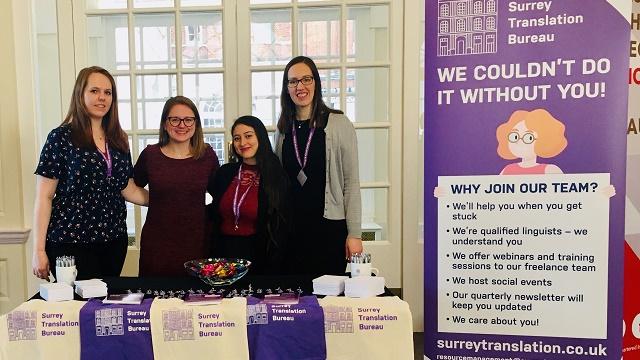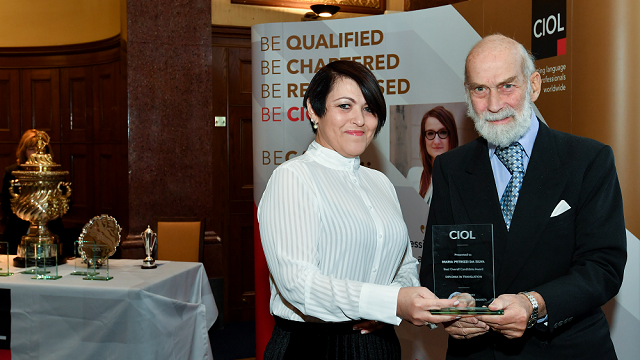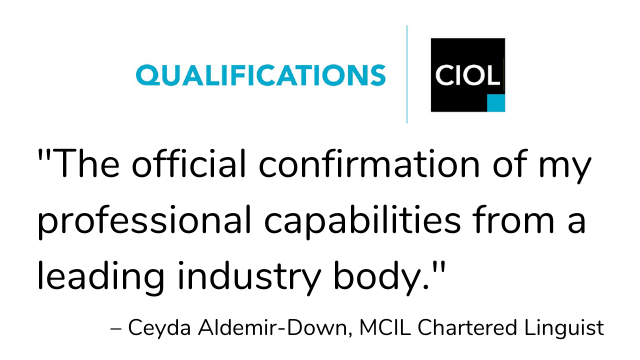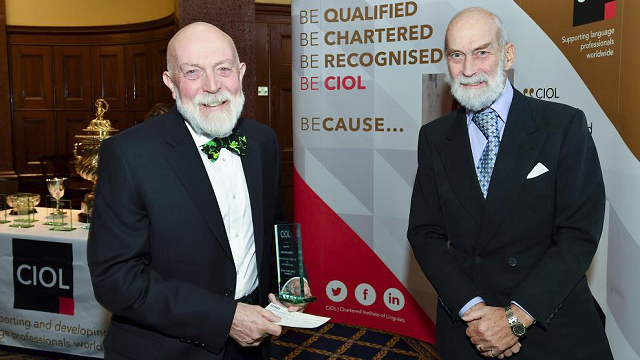-
QUALIFICATIONS
- For Linguists Worldwide
- For UK Public Services
- Preparation
- Policies & Regulation
-
MEMBERSHIP
- Join CIOL
- Membership grades
- NEW for Language Lovers
- Chartered Linguist
- Already a member?
- Professional conduct
- Business & Corporate Partners
-
ASSESSMENTS
- For Second Language Speakers
- English as a Second Language
-
EVENTS & TRAINING
- CPD, Webinars & Training
- CIOL Conference Season 2025
- Events & Networks
- CIOL Mentoring
-
NEWS & VOICES
- News & Voices
- CIOL eNews
- CIOL Awards
- The Linguist
- Jobs & Ads
-
RESOURCES
- For Translators & Interpreters
- For Universities & Students
- Standards & Norms
- CIOL & AI
- All Party Parliamentary Group
- In the UK
- UK Public Services
- Find-a-Linguist
7 Ways to Stand Out as a Professional Translator
Guest blog by Lucy Williams
The translation industry can seem like a crowded marketplace. Within your language pair, you may find there is a lot of competition. How can you stand out from the crowd as a professional translator? Here are seven ways to look the part as a professional translator.
1. Get a qualification
Anyone can claim to be a translator. There are no entry requirements for the industry. Most professional translators have a translation qualification because it demonstrates their professionalism and translation skills. A translation qualification shows that you understand translation and your working languages. Some translators choose postgraduate-level qualifications like an MA in translation or the Diploma in Translation from the Chartered Institute of Linguists.
A qualification demonstrates your translation abilities. For customers who don’t know much about the translation industry, it shows them what you can do. It shows you have the knowledge and skills required to produce high-quality work.
2. Specialise
New translators are often advised to specialise. Why? Specialisation makes a translator faster and more productive. It makes you an expert in a certain field. That means you are better placed to pitch to some customers than a generalist would be. And if you were the customer, wouldn’t you prefer to hire someone who knew your industry inside out? It would save you time and hassle and you’d have peace of mind. Specialising makes you look like a professional translator with expert knowledge. It also means you can concentrate on work that is more enjoyable and more profitable.
3. Join a professional association
Membership of a professional association demonstrates that you take a professional approach to your work. Most professional translators are members of one or more. Entry requirements vary and what they offer also varies. Some, like the ATA, offer their own certification programmes. The Chartered Institute of Linguists allows members to use the letters MCIL after their names and offers professional indemnity insurance and access to a free legal helpline.
Being a member of a professional association helps professional translators stand out in other ways:
Directory listings. Most translator associations have directories of translators that potential customers can access.
Networking. Being a member of a professional association can help you make contact with other professional translators.
Professional development. Many associations offer annual conferences, training sessions and webinars. You can use this CPD to show customers that you are continually updating your skills.
Code of ethics. Professional associations have their own codes of ethics and members agree to adhere to these when they join.
Resources for translators. Many professional associations have member-only resources available. This may include translation tools to help with quality and productivity, or discounts on software.
4. Become a Chartered Linguist
Becoming a chartered professional in any industry is a mark of quality and competence. The Chartered Institute of Linguists now offers chartership to all full-paying CIOL Members and CIOL Fellows (MCIL and FCIL). Applications are also welcome from members and fellows of the Institute of Translation and Interpreting (ITI) and the International Association of Conference Interpreters (AIIC).
Chartership has many benefits. As the gold standard for linguists, it provides a professional image and gives you parity with other professionals. Chartership is a sign of professional quality and competence and helps inspire confidence in potential customers. It demonstrates your commitment to Continuing Professional Development. Becoming a chartered linguist is an excellent way to differentiate yourself and help you stand out from the crowd. For more information about chartership: https://www.ciol.org.uk/chartership.
5. Offer related services
Some professional translators offer a range of related services. Yes, most translators are also proofreaders, but what about other services? Professional translators are trained linguists and some offer services like bilingual copywriting or SEO translation. These can be useful add-ons for fields like marketing translation. It can be a good way to make yourself stand out. SEO translation is an area where professional translators can add value.
6. Have a professional website
If you want to stand out from the crowd as a professional translator, you need to look the part. This means a professional website that’s easy to navigate, with clear terms and conditions. It’s important to have an Internet presence as many customers will use that to decide if you’re trustworthy. If you can’t be found online or your online presence is confusing or unprofessional, it doesn’t make you look like a good option for the customer.
7. Respond quickly and professionally
Once the customer has found you and made contact, a lot will depend on how you respond. If you take a long time to answer queries or are unhelpful, they’ll go elsewhere. It might seem obvious, but good service isn’t always a given. Responding promptly and professionally is one way to build trust.
Although you probably spend most of the time behind a computer screen, a bit of old-fashioned customer service can go a long way. Not everything has to be via email. It can sometimes help to pick up the phone and talk to the customer.
Creating systems and templates for quoting also helps differentiate you as a professional translator. You don’t want to get as far as being asked for a quote, and then miss out on the job.
It can be hard starting out as a professional translator. But creating a professional image and mindset will help you develop your career and make sure you stand out from the crowd.
About the author
Lucy Williams is a freelance Spanish-to-English translator and translator trainer. She holds the Diploma in Translation (two merits) and has been working as a freelance translator since 2009. Lucy specialises in fashion, tourism, art, literature and social sciences. She is also a copywriter. You can read her blog at translatorstudio.co.uk. Twitter: @LucyWTranslator.
More
The Chartered Institute of Linguists (CIOL), Incorporated by Royal Charter, Registered in England and Wales Number RC 000808 and the IoL Educational Trust (IoLET), trading as CIOL Qualifications, Company limited by Guarantee, Registered in England and Wales Number 04297497 and Registered Charity Number 1090263. CIOL is a not-for-profit organisation.








